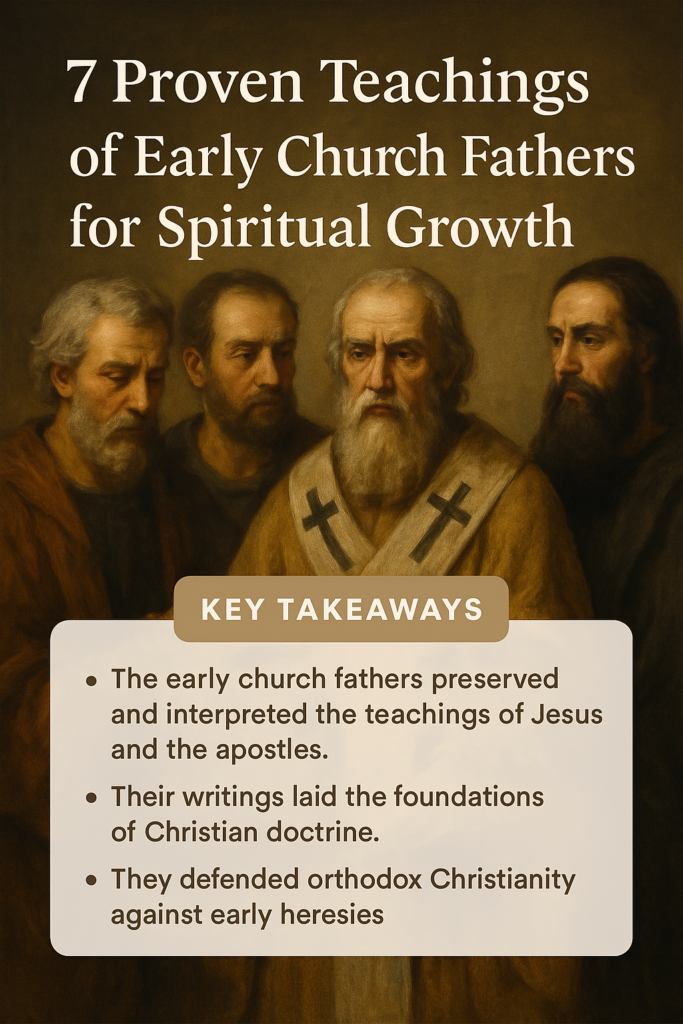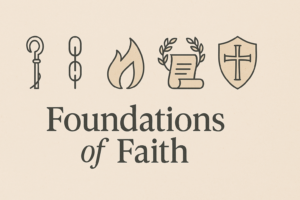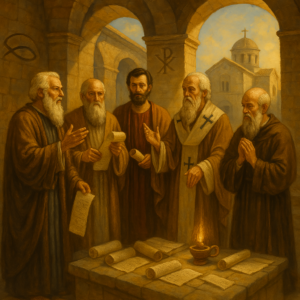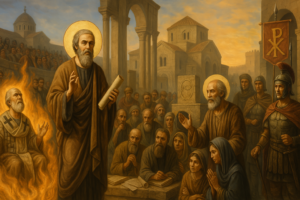
Estimated reading time: 15 minutes
Key Takeaways
- The early church fathers were instrumental in preserving and interpreting the teachings of Jesus and the apostles.
- Their writings laid the foundations of Christian doctrine during the first centuries of the Church.
- They defended orthodox Christianity against early heresies that threatened core beliefs.
- Understanding their teachings provides insights into the historical development of Christianity.
- Notable figures include Ignatius of Antioch, Polycarp of Smyrna, Justin Martyr, and others.
Introduction
The early church fathers were influential theologians, bishops, and scholars who shaped the first centuries of Christianity after the apostles. These remarkable individuals played a crucial role in preserving and interpreting the teachings of Jesus and the apostles during a time when the young faith faced numerous challenges from both inside and outside the Christian community. Their tireless efforts contributed significantly to the formation of Christian doctrine, establishing a theological framework that would guide believers for generations to come. Additionally, they courageously defended orthodox Christianity against early heresies that threatened to distort the faith’s core message.
Understanding the teachings of the early church fathers provides modern Christians with invaluable insights into how the faith developed and was understood by those closest to its origins. Their apostolic fathers writings serve as a bridge between the New Testament era and later Christian thought, offering a window into how the earliest Christian communities interpreted and applied apostolic teaching. These early Christian writings also reveal the historical context in which foundational doctrines emerged, showing how the church responded to questions and controversies in its formative years. By studying the early church fathers beliefs, we gain a deeper appreciation for the theological heritage that continues to shape Christianity today.
Historical Overview of the Early Church Fathers
Church Fathers from Clement of Rome to Augustine
The timeline of the early church fathers spans approximately five centuries, beginning with Clement of Rome (c. 35-99 AD), who wrote one of the earliest Christian documents outside the New Testament, and extending to Augustine of Hippo (354-430 AD), whose profound theological works continue to shape Christian thought today. This remarkable period of early church fathers history was marked by intense persecution, with many fathers facing imprisonment, exile, or martyrdom for their faith.
The first generation, known as the Apostolic Fathers (c. 90-155 AD), included figures like Clement, Ignatius of Antioch, and Polycarp of Smyrna, who had direct connections to the apostles. They were followed by the Apologists (c. 130-180 AD), who defended Christianity against pagan accusations and philosophical objections.
The third and fourth centuries saw the rise of systematic theologians like Irenaeus, Tertullian, and Origen, who developed more comprehensive theological frameworks. The post-Nicene fathers, including the Cappadocian Fathers, Ambrose, and Augustine, refined Christian doctrine following the Council of Nicaea (325 AD) and subsequent ecumenical councils.
Formation of Christian Doctrine During This Era
The formation of Christian doctrine during this period was largely driven by the need to address challenges to the faith. As Christianity spread throughout the Roman Empire, it encountered various philosophical traditions and religious beliefs that influenced how converts understood their new faith. The fathers worked diligently to clarify what was authentic Christian teaching and what was not.
Their theological work was often reactive, responding to heresies like Gnosticism, Marcionism, Montanism, Arianism, and Pelagianism, which threatened to undermine core Christian beliefs. Through careful study of scripture, reasoned argument, and the preservation of apostolic tradition, the fathers systematically developed and codified Christian doctrine.
The early church fathers on the Trinity made particularly significant contributions, moving from the basic affirmations found in scripture to the more precise theological formulations that would become orthodox doctrine. Their work culminated in the ecumenical councils, where key doctrines were officially defined and heretical views condemned.
Key Early Church Fathers and Their Contributions
Saint Ignatius of Antioch
Overview of Saint Ignatius of Antioch
Saint Ignatius of Antioch stands as one of the most influential apostolic church fathers, serving as the third bishop of Antioch in Syria during the early second century. His significance in early Christianity cannot be overstated, as he was a pivotal figure who emphasized the importance of church unity under episcopal leadership. Tradition suggests he may have been a disciple of the Apostle John, positioning him as a direct link to apostolic teaching.
Ignatius faced martyrdom under Emperor Trajan around 107-110 AD, and his journey to Rome for execution became an opportunity for him to strengthen and encourage Christian communities along the way. His unwavering courage in the face of death demonstrated his profound faith and commitment to Christ, making him a model for Christians facing persecution.
Learn more about Saint Ignatius of Antioch
Examination of Ignatius of Antioch’s Writings
The Ignatius of Antioch writings consist of seven authentic letters written to various churches in Asia Minor and Rome during his final journey. These early Christian writings reveal several key themes that were crucial for the developing church:
- Church unity and structure: Ignatius strongly advocated for a single bishop in each church, assisted by presbyters (elders) and deacons, establishing what would become the standard ecclesiastical hierarchy.
- The Eucharist: He emphasized the importance of the Eucharist as the “medicine of immortality” that unites believers with Christ.
- Warnings against heresy: Ignatius cautioned against Docetism, which denied Christ’s physical body, insisting instead on both Christ’s divinity and humanity.
- Martyrdom: His letters reflect a passionate desire for martyrdom, which he viewed as the ultimate imitation of Christ.
These letters provide invaluable insights into early church organization and theology during a formative period when apostolic teaching was being preserved and transmitted.
Explore the writings of Ignatius of Antioch
Church Fathers on the Resurrection
The resurrection stood at the center of early Christian proclamation, and the church fathers vigorously defended this doctrine against both pagan skepticism and heretical reinterpretations. Their teachings on the resurrection addressed both the reality of Christ’s own resurrection and the future resurrection of believers. They emphasized the physicality of the resurrection body, countering Gnostic and other dualistic teachings that denied the value of the material body. By affirming the resurrection, the fathers reinforced the Christian hope in eternal life and the ultimate redemption of both body and soul.
Frequently Asked Questions
Q: Who were the early church fathers?
A: The early church fathers were influential theologians and leaders in the early centuries of Christianity who played a key role in developing Christian doctrine, defending the faith against heresies, and preserving apostolic teaching. They include figures such as Ignatius of Antioch, Polycarp of Smyrna, Justin Martyr, Irenaeus of Lyons, and others.
Q: Why are the writings of the early church fathers important?
A: Their writings provide valuable insights into how early Christians interpreted Scripture, understood key doctrines, and practiced their faith. Studying these writings helps modern Christians connect with the historic roots of their beliefs and understand the development of theological concepts over time.
Q: How did the early church fathers contribute to the doctrine of the Trinity?
A: The early church fathers played a crucial role in articulating and defending the doctrine of the Trinity. Through theological reflection and debate, they clarified the understanding of God as one being in three persons—Father, Son, and Holy Spirit—while addressing heresies that challenged this concept. Their work laid the foundation for the formulations established in the early ecumenical councils.
Q: Where can I read the works of the early church fathers?
A: Many of their writings are available online through resources like New Advent and Christian Classics Ethereal Library. These platforms provide access to translations of their works, allowing readers to explore their teachings firsthand.



